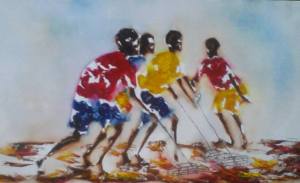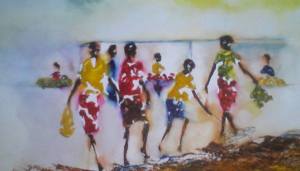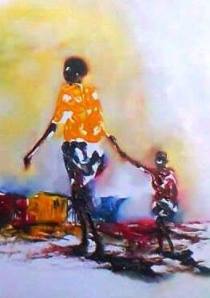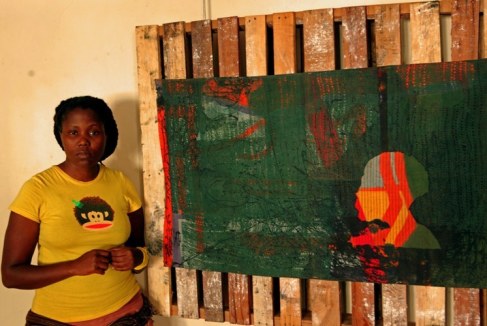
Original caption: President of Zimbabwe Robert Mugabe listens as Prof. Alpha Oumar Konare, chairman of the Commission of the African Union, addresses attendees at the opening ceremony of the 10th Ordinary Session of the Assembly during the African Union Summit in Addis Ababa, Ethiopia. (Photo credit: Wikipedia)
At 88-years-old, Robert Mugabe has been President of Zimbabwe since 1980. He has presided over the decline of his country, the death of millions of people and is determined to carry on as President for as long as he possibly can.
Who is Robert Mugabe?
Robert Gabriel Mugabe was born on Feb 21,1924. His father was a carpenter and his mother a teacher. His father went to South Africa when Mugabe was young, supposedly to work at a Jesuit Mission, but he never came home, leaving his mother to bring up her four children on her own.
Robert Mugabe received a good education, attending a local Jesuit Mission, then studying privately whilst teaching. He went to the University of Fort Hare in South Africa where he received a BA in History and English in 1951. He did a correspondence course to gain a Bachelor of Education degree in 1953 and a Bachelor of Science in Economics which he did through the University of London and then completed in 1958 after moving to Ghana. He met and married his first wife, Sarah Heyfron whilst still in Ghana.
Entry Into Politics
Mugabe had declared himself to be a Marxist whilst still in Ghana but it wasn’t until he returned to his home town in what was then Southern Rhodesia to introduce his wife to his family that he became involved in politics. He felt strongly that the black residents were being denied basic civil rights and joined the National Democratic Party. The party was banned in 1961 and then reformed to become the Zimbabwe African Peoples Union (ZAPU). The leader of the party was Joshua Nkomo, who would later become a target of Mugabe’s hatred. Mugabe felt that the talks being held between ZAPU and the United Nations, demanding a change in the constitution of the country was not going far enough. He called for a guerilla war.
Prison
In 1963, he and other former supporters of Nkomo founded their own resistance movement in Tanzania, calling it the Zimbabwe African National Union (ZANU). When he returned to his home country he was promptly arrested and sent to prison, where he would remain for ten years. In November 1964, the Prime Minister, Ian Smith, called for a Unilateral Declaration of Independence from British rule and the country of Rhodesia was born.Whilst in prison, Mugabe continued to educate himself and his fellow prisoners. He was freed in 1974 and went into exile in Zambia and Mozambique.
The Guerilla War
A bloody war broke out between the people and government of Rhodesia and the guerilla movements, ZANLA loyal to Mugabe and ZIPRA loyal to Joshua Nkomo. The two groups were divided on tribal lines. Whilst the war was seen by many as strictly white against black, this was not in fact true. Many of the black population of Rhodesia fought valiantly to protect their homeland. By 1978-1979, the majority of regiments in the Rhodesian army were composed of all black troops, with the Rhodesian African Rifles perhaps the most famous. Many civilians were killed during the bitter battles that raged across the country.
Zimbabwe is born
In 1978 an agreement was reached between the government of Ian Smith and moderate black leaders in Rhodesia. Bishop Abel Muzorewa became the Prime Minister of what then became known as Zimbabwe-Rhodesia. However, neither ZANU or ZAPU had taken part in the agreement and the British government then intervened, brokering the Lancaster House Agreement. Elections were held in 1980 and Robert Mugabe swept to power. At first, he worked hard to convince the white population, especially the farmers whose hard work had made Rhodesia the bread basket of Africa, to stay. However, he still had his arch enemy to deal with. In 1982, Mugabe sent his Fifth Brigade, elite soldiers trained by the North Koreans, into Nkomo’s stronghold in Matabeleland, the southern province of Zimbabwe. Many thousands of people were killed in what many people see as a form of political genocide.
From Popular President to Tyrant
At first, Mugabe’s election was seen as a good choice by all sides,with restructuring the economy, building schools and clinics and encouraging manufacturing all part of his original five year plan, but as time passed, he became more tyrannical , proving the old saw about “absolute power corrupting absolutely”. Anyone who didn’t agree with him was likely to suffer unfortunate accidents, including those who had been at his side throughout the guerilla war. His wife died, leaving him free to marry his much younger mistress, Grace Marufu.
By 1996, his unpopular decisions began to cause real hardship to his people. His decision to seize the land of white farmers, paying no compensation and killing those that refused to move, meant that the food chain spiralled into chaos. Unemployment shot up as did inflation. He managed to get himself re-elected by using scare tactics and in some cases outright force. From being the bread basket of Africa, Zimbabwe now turned to the international community for assistance.
Economy Out of Control
Mugabe’s decisions led to the economy going into meltdown with the Zimbabwe dollar going into a rate of hyperinflation almost unprecedented. Spending on healthcare, education and housing came to a virtual standstill which meant that the AIDS virus was able to take a death grip on the population with 1,2 million of the population suffering HIV or AIDS in 2011 according to a report by UNAIDS, a further 1,6 million people are predicted to be unable to find sufficient food in the first three months of 2013 and regular cholera outbreaks are further decimating an already suffering population. The sick and starving people are forced to read about Grace Mugabe’s frequent shopping trips to Europe with the British Sun newspaper claiming that she has spent over 1,2 million pounds feeding her shopping habit.
Mugabe Now
In 2008, Mugabe was forced to accept a power sharing deal with the opposition Movement for Democratic Change (MDC), led by Morgan Tsvangirai, following negotiations brokered by South Africa. This has in no way decreased the violence that is a way of life for Zimbawean citizens.
2013 will see a new round of elections that the 88 year old Robert Mugabe is confident he will win. There have been rumours of health problems, including prostate cancer, that he has shrugged off as being “colonialist propoganda”.
Human Rights Watch said in a report released on Jan 10 2013 says that “Zimbabwe’s “unity government” is failing to carry out reforms in the country’s Global Political Agreement that are vital for the country to hold credible, free, and fair elections in 2013”. Many Zimbabweans fear that, if there are elections, there will be the same violence that has characterised all the previous elections and that nothing will change. As long as Robert Mugabe remains in power, their fears are justified.

 Paintings by George Masarira (with permission)
Paintings by George Masarira (with permission)


